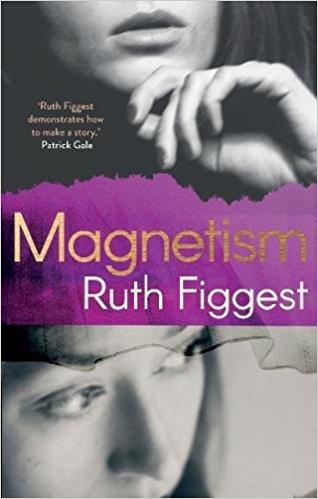 This week I am delighted to be hosting a debut novelist with an exceptional track record: Ruth Figgest, who was born in Oxford and grew up in the USA, has been short-listed an incredible six times for the Bridport Prize – she was awarded 2nd place in 2012 and was Highly Commended in 2017. Her debut novel Magnetism, set in the American Midwest and Southwest, is one of my spring picks; at Christmas the paperback went with me to Vietnam, where I could hardly put it down, and back so I can read it again one day (very few books make it back!).
This week I am delighted to be hosting a debut novelist with an exceptional track record: Ruth Figgest, who was born in Oxford and grew up in the USA, has been short-listed an incredible six times for the Bridport Prize – she was awarded 2nd place in 2012 and was Highly Commended in 2017. Her debut novel Magnetism, set in the American Midwest and Southwest, is one of my spring picks; at Christmas the paperback went with me to Vietnam, where I could hardly put it down, and back so I can read it again one day (very few books make it back!).
We all know that the driver of great fiction is conflict, and Ruth’s novel centres on a fraught and complicated mother-daughter relationship which many readers will recognize from real life. This is something which fascinates me, albeit not through choice. Considering that I’ve been living, reading and writing about it for years, it’s surprising that this is the first in-depth discussion of the subject on my blog:
Ask a woman about her feelings about her mother and you’ll get a variety of responses ranging from adoration to love, frustration, annoyance and hatred. That question is not too threatening to answer; a level of separateness is implied. But it’s a more loaded question if you ask a woman to consider how similar she is to her mother. Are you as beautiful, clever, have you achieved as much? Do you live up to her expectations, or is your mother so overpowering that you need to escape and avoid all possible competition? I thought that this subject matter was fertile with potential and, therefore, would be interesting to explore.
Magnetism is written in the first person present tense, from the point of view of Erica, who is the daughter of Caroline and the story unfolds in a backward chronology. The story is about the shifts in their relationship and the structure strips back the layers of the characters’ interactions to the core – when it is most intimate and dependent. There is a gradual release of information to satisfy the reader’s curiosity about why these women behave as they do toward each other and toward the other people, particularly the men, in their lives.
The title Magnetism signposts the seesawing attraction and repulsion dynamic in this relationship between child and mother. The child Erica thinks of her mother as a super hero, but a grownup Erica often feels desperate for her mother to respect her feelings and to be firmly “on her side”. As much as Erica demands “truth” from her mother, Caroline resists. Erica struggles to resist her mother’s advice, but they’re locked in it all together. “Because I am her daughter we are forever part of each other. It’s different for us because our lives overlap. We are in it together. We’re in that Japanese restaurant and outside this drugstore together forever.”
Women are often ambivalent about their relationships with their mother and mothers, similarly, get frustrated with their daughters. There’s potential for jealousy as the daughter becomes a woman at the very same time as the mother hits her middle years. The relationship between mothers and daughters tends to become most fraught at this time of adolescence. What kind of woman will the daughter want to be? And the tension can heighten again when a daughter herself becomes a mother and the comparison is underlined – what kind of a mother will she choose to be?
A mother is the only person who has known her child from the start, who knows her intimately, and holds memories of the daughter’s infancy and childhood that even the daughter is unaware of. For the daughter, her mother is the first impression of the world and of herself. The mother of a vulnerable infant girl might be affectionate or indifferent, might protect or neglect, be affirming or insecure and jealous. This dynamic sets stage for the way that girl will grow up to deal with life – even if she decides that she would never do it like that. Such a close bond has the potential for huge hurt. If the person who knows you most well has something to say about you, isn’t she surely right? How can you choose not to listen?
Though she never states it, the reader might consider that Caroline feels she sacrificed herself in order to give Erica a life Caroline couldn’t have had, and that she expects the gift to be reciprocated. Such a pressure of expectation can be an enormous one and Erica wonders what she owes her mother now that she’s grown.
I recall a terrifying trend for mother-daughter outfits at one point in my childhood. Women would make dresses in the same material and style for themselves and for their daughters. The girl was made into a mini-me of the mother, and the mother reduced to a more child-like appearance – pink gingham, frills and all. Does a mother of a twenty-year-old girl see a younger, more accomplished or a less attractive, disappointing version of herself? Is the freedom of youth with all that possibility ahead threatening?
Though we might rail against it, the physical similarities that we women inherit from our mothers are inevitable. An even older Erica fears the prospect of turning into her mother: ‘I look like her more and more every year. . .before me now in the mirror an old woman is creeping up on me or, rather, emerging from within. Dryness, wrinkles, a dullness. A before ad for face creams. A witch.’
My children have hardly any curiosity about my life before I was a mother, but I’ve also shown insufficient interest in my own mother’s life, except in how our lives intersect. I’ve been guilty of impatience when my mother tells a story of her life before I was born. Perhaps it’s too threatening to consider how her life might have been if I hadn’t come along. The first-person narration of Magnetism is useful in parts to reflect upon this sort of youthful self-centred pre-occupation. Erica finds her mother mysterious and only gradually pieces together the facts of her mother’s life, and most of this is done after she has died, when it is too late to question her.
What we might fail to reckon upon when we’re young is that our mothers are changing at the same time we are. Nothing is ever static. I hope that this is clear in the book. Even if Erica doesn’t always understand what’s up with her mother, I trust that the reader will.
Author photo © Nicky Thomas LRPS
Thank you to Ruth for this insightful piece – I found it so interesting to hear about the thinking and intentions which lay behind the book.

For a description of the book, click here.
Unsurprisingly, this debut novel impressed immediately with the calibre of the writing. Erica’s voice has a frank and intimate quality and although it’s her side of the story we hear, her mother also comes across as a well-rounded character. Everything about this book feels believable and that’s what makes it so poignant and engaging. Figgest makes good use of reverse chronology – whilst it’s a risky approach which changes the reader’s experience of any story, it makes sense as the means to examine a lifelong bond, as described above. The fact we know how it ends doesn’t preclude some well-handled surprises.
This is an emotionally intelligent and truthful take on an uncomfortable topic; it dares to take on some of the taboos and expectations concerning motherhood and portrays the painful and far-reaching consequences of the tension and conflict so often present in mother-daughter relationships. Whilst this is a dark and serious novel, it sparkles with humorous moments, strong secondary characters and punchy dialog. Clearly the story touched me on a deeply personal level but readers without that kind of baggage will also find much to relate to. I believe there is both need and demand for fiction with a ‘grown-up’, honest portrayal of women’s lives, challenging some of the prejudiced and often patronising received ideas about female experience, which even influence which stories make it out there. Anyone who writes or publishes it has my admiration, especially when it’s this well done.
*POSTSCRIPT*
This week I am in Marseille, staying with one of my oldest friends and doing some research for my novel-in-progress set in Paris and Provence, so next week I’ll be posting a few thoughts and pictures from France’s second city.
Advertisements &b; &b;
